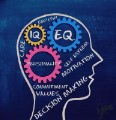IQ isn’t EQ
Michael Clegg | 02/07/2024
Leadership is NOT the same as it was a few years ago.
Economic uncertainty, and societal challenges, call for a new skill set from leadership. At the forefront of this shift is emotional intelligence (EQ), a concept that has gained increasing recognition for its pivotal role in effective leadership.
Emotional intelligence, popularized by Daniel Goleman’s seminal work, encompasses the ability to perceive, manage, and regulate emotions. Studies have shown a direct link between EQ and financial success, with individuals possessing higher EQs earning significantly more annually.
LEADERS need to possess these 7 traits to be effective leaders (outlined by NLCTB):
L – Listen
Emotionally intelligent leaders prioritize listening over speaking, recognizing that effective communication begins with truly hearing and understanding others. They create space for open dialogue and actively engage with their team members’ perspectives and ideas.
E – Equip
Leaders with Emotional Intelligence will equip their employees with the necessary tools and resources to excel in their roles. This includes training, upskilling, technology, and support systems to empower their team members to perform at their best.
A – Appreciate
Emotionally intelligent leaders value and acknowledge the contributions of their team members, expressing gratitude through words, gestures, and actions. They recognize that showing appreciation fosters morale, loyalty, and a positive work environment.
D – Develop
Growth and development of their employees is another trait that leaders with EQ possess. They recognize that their employees are valuable assets to the organization. They create opportunities for skill-building, mentorship, and career advancement, nurturing talent and fostering a culture of continuous learning.
E – Enlist
The power of collaboration and teamwork is critical in achieving organizational goals, and leaders with EQ know this. They actively involve their employees and team members in decision-making processes, leveraging their diverse perspectives and expertise to drive change effectively.
R – Relationships
This starts with connection. Building deep relationships is a high priority to leaders with EI. They that the strength of their professional relationships is paramount to the success of the organization. They invest time and effort in building trust, rapport, and mutual respect with their colleagues, clients, and stakeholders, knowing that strong relationships are the foundation of effective leadership.
S – Service
Also known as “Servant Leadership”, a lot of leaders are already catching onto this. They actively prioritize the needs and well-being of their employees over their own. They seek opportunities to support, mentor, and empower their team members, understanding that by serving others, they ultimately drive collective success and organizational growth.
A lot of this comes from possessing Emotional Intelligence (EQ). With that, there are four pillars that stand as the foundation.

It all starts with Self-Awareness. If you aren’t self-aware, you aren’t off to a good start.
While many leaders believe they possess high self-awareness, research suggests a significant gap between perception and reality. In fact, Forbes states that only 15% of people are actually self-aware! Ongoing coaching and reflection are essential for enhancing self-awareness and cultivating effective leadership.
Self-reflection is something that I value as a leader, and journaling has really helped me along the way. All leaders could benefit from their own coaching, upskilling, and training.
That’s why I have the Leadership Squared (Leadership2) Model. This is where Culture and Connection meet, and a big part of connection starts with having the EQ first, and then putting the rest of the framework in place (I go more in depth in my video here for those of you who are interested in learning more about that).
The next part of EQ is empathy. Empathy enables leaders to understand and care about the feelings and experiences of others. Genuine empathy fosters trust, promotes meaningful dialogue, and strengthens team cohesion.
While both of those are things that we control inwardly, the last two pillars of EQ are what we control and manage in our outward behavior. Self-regulation is what we would use to evaluate what happens in the outside world and control how we respond to those things, rather than reacting. Social skills are self-explanatory. That’s how you communicate with your team and build those connections and relationships with your employees.
So, as we continue to navigate the evolving landscape of leadership, embracing emotional intelligence emerges as a strategic imperative. By honing our emotional intelligence skills, we can empower ourselves to lead with compassion, resilience, and authenticity in an ever-changing world.
Image Source: Wellable
Want more leadership-focused content?




